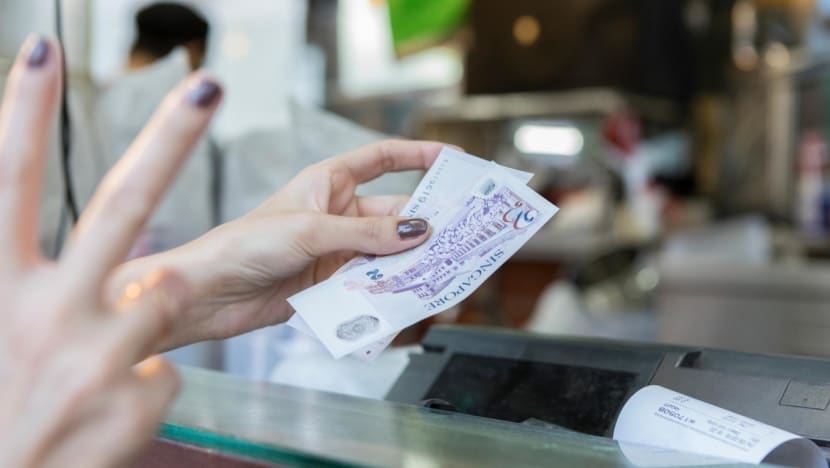Cheques, passbooks and 1-cent coins: 5 ways money and banking transactions have changed in Singapore
Amid falling cheque usage and higher processing costs, banks in Singapore will start charging customers for issuing Singapore dollar-denominated cheques by November.

Change is a constant when it comes to how people interact with money and financial institutions in Singapore. (Photo: iStock)
SINGAPORE: The announcement on Friday (Jul 28) that banks in Singapore will soon start charging customers for issuing Singapore dollar cheques marked another shift in how people interact with money and financial institutions in the country.
At least seven banks will start imposing fees on cheque issuers by Nov 1, ahead of the phasing out of corporate cheques by the end of 2025 and individual cheques at a yet-to-be-determined date sometime after.
While it will mark the end of an era, change is a constant when it comes to money in Singapore.
Here's a look at five ways money and banking transactions have changed here.
We use less cash
How often do you use coins and notes to pay for things? As opposed to contactless card payments, mobile wallet payments and payments through services like PayNow?
For many people in Singapore, it's entirely possible to go days without handling physical currency.
While an entirely cash-free Singapore is difficult to imagine, there are precedents for how legal tender can fade away.
Having not been issued since April 2002 because of a lack of usage, 1-cent coins have become curios from a bygone era.
At the other end of the scale, S$10,000 and S$1,000 banknotes have also been discontinued in more recent years. Their phasing out was for a different reason though – to prevent money laundering and terrorism financing.
But don't fret if you're presented with these. Both denominations, as well as 1-cent coins, remain legal tender.
And our cash use is becoming more sustainable
Even if cash does not disappear, it can evolve under the radar.
Paper S$2, S$5 and S$10 banknotes gradually disappeared after the introduction of longer-lasting polymer notes in 2004.
According to a 2013 study by the Bank of England, the longevity of polymer notes means that they have a smaller environmental impact than paper notes.
The study assumed that a polymer note lasts 2.5 times longer than a paper note, but found that polymer notes need only last 1.33 times longer than paper notes to achieve a lower impact.
The longer lifetime of polymer notes – beyond a century for £50 notes – means that "substantially fewer" are needed to provide the same function as a given quantity of paper notes, the study said.
This means that fewer raw materials are needed and less processing is involved to produce enough polymer notes, which the study found is the main reason for their better environmental performance.
In the name of sustainability, we're also seeing changes to the production of new banknotes for Chinese New Year.
In the past, about 100 million new notes were issued in Singapore annually for Chinese New Year and other festive periods. A "large majority" was used once for gifting and then returned to the Monetary Authority of Singapore (MAS) shortly after.
Most of the returned notes are recirculated, MAS said last year, but excess notes accumulate and are destroyed before the end of their useful life as they "far exceed" replacement demand.
The carbon emissions produced from issuing excess new notes annually are comparable to powering 430 four-room flats, it said.
As part of its efforts to "pave the way for a sustainable future where MAS will no longer issue new notes for festive giving", the central bank has encouraged the use of "fit-for-gifting" notes, which require less processing than new or good-as-new notes, and e-gifting.
Our holiday spending habits are evolving
A trip to a money changer is an essential part of the build-up to a holiday.
But with most travellers carrying debit and credit cards that they can use easily overseas, obtaining physical foreign currency before a trip is not as important as it used to be.
And now it is the multi-currency wallets offered by the likes of YouTrip, Wise and Revolut that are muscling in on the action, offering more attractive exchange rates to their users.
Passbooks have all but disappeared
Once a handy method to keep track of your bank transactions, passbooks have become reminders of a more analogue time.
They have also become a symbol of the difficulties that some are facing as banking in Singapore goes digital.
Earlier this year, TODAY interviewed 10 seniors who had gone to various bank branches around the country, mostly to withdraw and change money and update their passbooks.
Many felt like they had been left behind amid the big push towards digital banking, which was accelerated by the COVID-19 pandemic.
One senior TODAY spoke to, retired engineer Choo Boon Hock, said that he liked visiting his local DBS branch to update his passbook on a weekly basis. This is despite the fact that he has an internet banking account.
"I don't mind the journey because every week I come to the bank to update this book … so that I know how much money I have left," the Hougang resident said.
While everything a passbook provides is now available through online banking, ATMs offering passbook updates remain a fixture, ensuring that they will not disappear completely for the time being.
Physical bank tokens are being phased out
While they are a comparatively new part of the banking experience compared to passbooks, physical tokens are also on their way out.
DBS, for example, stopped issuing physical tokens in February 2021 and encouraged its customers to set up digital tokens. UOB, meanwhile, is going fully digital from Sep 1 this year.
And while OCBC still offers replacement physical tokens, it encourages customers who need new ones to instead switch to its digital OneToken.













.jpg?itok=3qYI2Kde)





